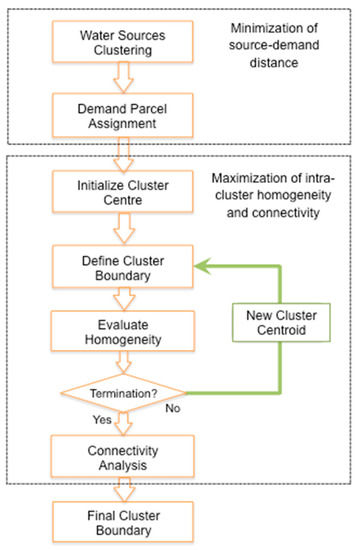A Clustered, Decentralized Approach to Urban Water Management
Published on by Water Network Research, Official research team of The Water Network in Academic
Abstract
Current models in design of urban water management systems and their corresponding infrastructure using centralized designs have commonly failed from the perspective of cost effectiveness and inability to adapt to the future changes. These challenges are driving cities towards using decentralized systems. While there is great consensus on the benefits of decentralization; currently no methods exist which guide decision-makers to define the optimal boundaries of decentralized water systems. A new clustering methodology and tool to decentralize water supply systems (WSS) into small and adaptable units is presented. The tool includes two major components: (i) minimization of the distance from source to consumer by assigning demand to the closest water source, and (ii) maximization of the intra-cluster homogeneity by defining the cluster boundaries such that the variation in population density, land use, socio-economic level, and topography within the cluster is minimized. The methodology and tool were applied to Arua Town in Uganda. Four random cluster scenarios and a centralized system were created and compared with the optimal clustered WSS. It was observed that the operational cost of the four cluster scenarios is up to 13.9 % higher than the optimal, and the centralized system is 26.6% higher than the optimal clustered WSS, consequently verifying the efficacy of the proposed method to determine an optimal cluster boundary for WSS. In addition, optimal homogeneous clusters improve efficiency by encouraging reuse of wastewater and stormwater within a cluster and by minimizing leakage through reduced pressure variations. View Full-Text
Keywords: decentralized water systems; cluster approach; intra-cluster homogeneity; Water Supply Systems (WSS); Urban Water Systems (UWS)


Figure 1
Author to whom correspondence should be addressed.
Dr. Thomas Missimer , Emergent Technologies Institute, U.A. Whitaker College of Engineering, 16301 Innovation Lane, Florida Gulf Coast University, Fort Myers, FL 33913, USA
(This article belongs to the Special Issue Management of Urban Water Services)
View Full-Text , Browse Figures, see full paper attached
Media
Taxonomy
- Integrated Urban Water Management
- Urban Water
- Urban Resource Management
- Urban Water Supply
- Urban Water Infrastructure
- Urban Design